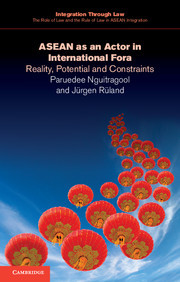Description
ASEAN as an Actor in International Fora
Reality, Potential and Constraints
Integration through Law:The Role of Law and the Rule of Law in ASEAN Integration Series
Authors: Nguitragool Paruedee, Rűland Jűrgen
This book charts new waters in research on ASEAN by studying the role and cohesion of ASEAN in international forums.
Language: English
Subject for ASEAN as an Actor in International Fora:
Approximative price 61.17 €
In Print (Delivery period: 14 days).
Add to cart
Publication date: 04-2015
Support: Print on demand
Support: Print on demand
Description
/li>Contents
/li>Biography
/li>
ASEAN as an Actor in International Fora addresses a blind spot in ASEAN research and in comparative regionalism studies by assessing why, how, when and to what extent ASEAN member governments achieve a collective presence in global fora. Written for academic researchers and practitioners working in areas such as international relations, political science and international law, it examines ASEAN's negotiating behavior with a novel four-point cohesion typology. The authors argue that ASEAN's 'cognitive prior' and its repository of cooperation norms have affected ASEAN's negotiation capacities, formats, strategies and cohesion in international fora. Using two case studies - one on ASEAN's cohesion in the WTO agricultural negotiations and one on UN negotiations on forced labor in Myanmar - they examine ASEAN's collective actions at different stages of negotiation, in different issue areas and in different negotiating fora. The book concludes by providing recommendations for strengthening ASEAN's international negotiation capacities.
General editors' preface; Acknowledgements; List of abbreviations; 1. Introduction; 2. Analytical framework: a cognitive approach of externalization; 3. ASEAN's cognitive prior and negotiating capacities; 4. ASEAN as a negotiator in global fora: stages of negotiation; 5. ASEAN as an actor in global fora: negotiation strategies; 6. Case studies; 7. Conclusions and future options; Executive summary; References; Index.
Paruedee Nguitragool is a lecturer at the School of International Affairs, Faculty of Political Science and Public Administration, Chiang Mai University (CMU), Thailand. Before joining CMU, she was a Research Associate at the Department of Political Science, University of Freiburg, Germany, and a guest researcher at many institutions in Southeast Asia, including Institute of Southeast Asian Studies (ISEAS) in Singapore, Centre for Strategic and International Studies (CSIS) and University of Indonesia (UI) in Jakarta, Indonesia. Her main research interests include the images of the West in Indonesia, and environmental politics and international relations in Southeast Asia.
Jűrgen Rűland is Professor of Political Science in the Department of Political Science at the University of Freiburg, Germany. He is also the Chairman of the university's Southeast Asia Program and Chairman of the Academic Advisory Board of the GIGA German Institute for Global and Area Studies, Hamburg (2006–14). Professor Rüland has published extensively on Southeast Asia and in 2007, Pacific Affairs awarded him and Christl Kessler the William L. Holland Prize for the best article in 2006. He was the Stanford University/National University of Singapore Distinguished Fellow for Contemporary Southeast Asia 2010 and fellow at the Freiburg Institute of Advanced Studies (FRIAS History) 2010/2011 and 2014/2015.
Jűrgen Rűland is Professor of Political Science in the Department of Political Science at the University of Freiburg, Germany. He is also the Chairman of the university's Southeast Asia Program and Chairman of the Academic Advisory Board of the GIGA German Institute for Global and Area Studies, Hamburg (2006–14). Professor Rüland has published extensively on Southeast Asia and in 2007, Pacific Affairs awarded him and Christl Kessler the William L. Holland Prize for the best article in 2006. He was the Stanford University/National University of Singapore Distinguished Fellow for Contemporary Southeast Asia 2010 and fellow at the Freiburg Institute of Advanced Studies (FRIAS History) 2010/2011 and 2014/2015.
© 2024 LAVOISIER S.A.S.




